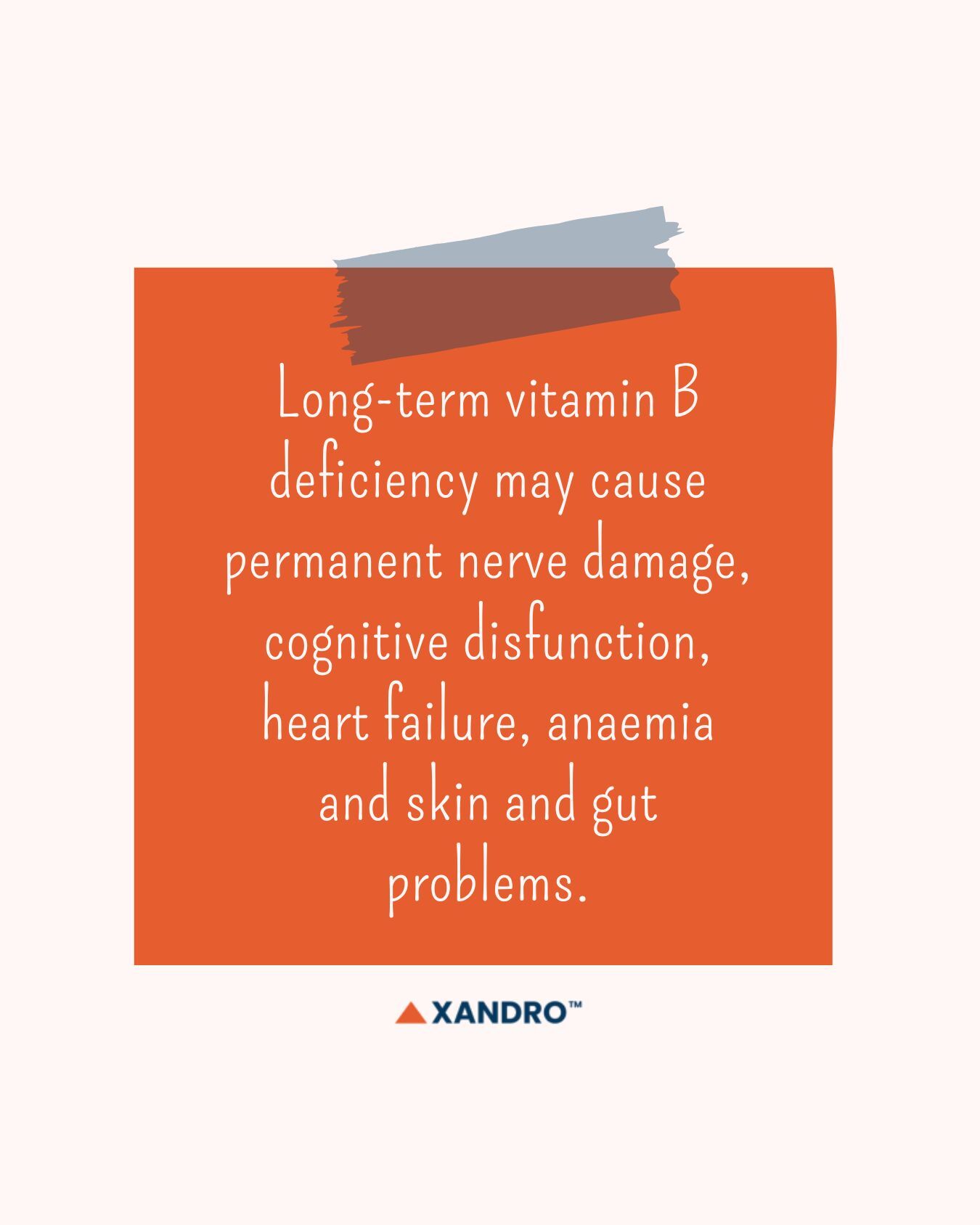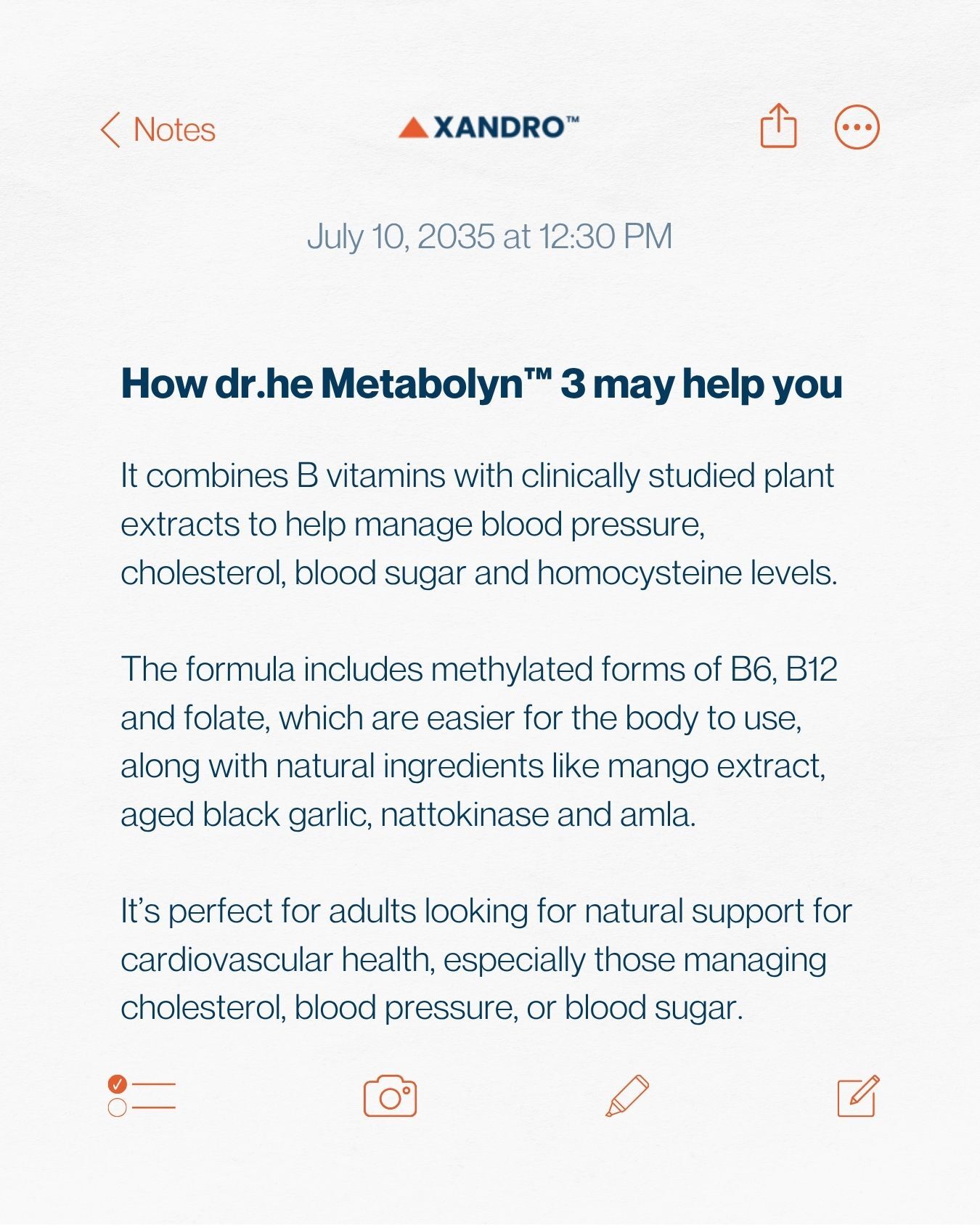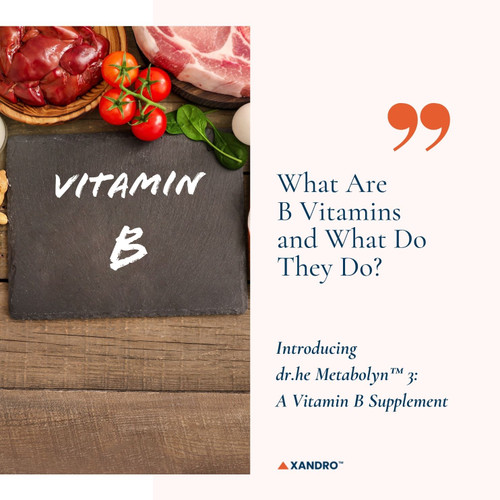What Does Vitamin B Complex Do for Your Body? Introducing dr.he Metabolyn™ 3
13th Jul 2025
Unlock the Power of Vitamin B: Benefits, Food Sources & Deficiency Signs
Ever wondered about B vitamins and their scientific names? Have you ever wondered which of these vitamins you may be lacking in your diet and if any are the cause of certain health issues you might have?
It’s a good idea to inform yourself about the important vitamins your body needs, vitamin B complex being one of them. Let’s go over what the vitamin B complex is, plus a B vitamins list, foods high in vitamin B and their benefits. We also cover how you may be able to get more B vitamins into your diet.
What Is Vitamin B Complex?
Vitamin B complex is a group of eight essential water-soluble vitamins that play important roles in keeping your body functioning properly. These vitamins help convert food into energy, support brain function, maintain healthy skin and nerves, and help in red blood cell production. Since they dissolve in water, your body doesn’t store them well, meaning you need to consume them regularly through your diet. The B vitamins include:
- Thiamine (B1): Helps turn food into energy and supports nerve function.
- Riboflavin (B2): Important for skin, eye health and energy metabolism.
- Niacin (B3): Helps with digestion, skin health and nervous system function.
- Pantothenic acid (B5): Supports hormone production and energy breakdown.
- Pyridoxine (B6): Helps with brain development, immune function and protein metabolism.
- Biotin (B7): Strengthens hair, nails and helps metabolise fats.
- Folate (B9): Needed for DNA synthesis, red blood cell formation and foetal development.
- Cobalamin (B12): Supports nerve function, red blood cell production and DNA synthesis.
Further Reading: List of Vitamins and Minerals and Their Uses
Vitamin B Complex: What Does It Do?
The B-complex vitamins act as a team to keep your body running smoothly. Their main job is to help turn carbohydrates, fats and proteins from food into usable energy. Without enough B vitamins, your metabolism slows down, leading to fatigue and weakness.
Other than energy production, each B vitamin has a specific role:
- Brain and Nervous System Support: B1, B6 and B12 help maintain healthy nerves and cognitive function. Low levels can cause memory problems, tingling in hands and feet, or mood changes.
- Red Blood Cell Formation: B9 (folate) and B12 are important for making red blood cells. A deficiency can lead to anaemia, causing dizziness and extreme tiredness.
- Skin and Hair Health: Biotin (B7) and riboflavin (B2) keep skin glowing and hair strong. A lack of these can lead to rashes, hair loss, or cracked lips.
- Immune & Digestive Function: B6 and niacin (B3) help your body fight infections and digest food properly.
Further Reading: Vitamins Common in Beauty Supplements for Hair, Skin and Nails

Key Vitamin B Benefits
Vitamin B complex is needed for a lot of health benefits, making it incredibly necessary for your overall health. Some of the most important benefits include:
- Boosts Energy Levels: B vitamins help break down food into fuel, preventing sluggishness and fatigue.
- Supports Mental Clarity: B6, B9 and B12 help produce brain chemicals that regulate mood and focus. Low levels are linked to depression and brain fog.
- Promotes Heart Health: B6, B12 and folate help lower homocysteine, an amino acid linked to heart disease when levels are too high.
- Help in Pregnancy and Foetal Development: Folate (B9) is critical in preventing birth defects like spina bifida. Pregnant women need extra folate for healthy baby development.
- Strengthens Immune Defence: B6 and B12 help produce white blood cells, which fight infections.
- Maintains Healthy Skin and Hair: Biotin (B7) reduces brittle nails and hair loss, while riboflavin (B2) keeps skin clear.
- Helps with Nerve Function: B1 and B12 protect nerve cells, preventing numbness and tingling in hands and feet.
Further Reading: The Best Vitamins for Muscle Pain
Is Vitamin B Good for Migraines?
Some B vitamins may help prevent migraines. Vitamin B2 (riboflavin) has been shown to reduce migraine frequency by supporting energy production in brain cells. Studies suggest taking 400mg daily can decrease attacks. Vitamins B6, B9 (folate) and B12 also help by regulating homocysteine, a compound linked to migraines when levels are too high.
How B Vitamins Boost Energy and Metabolism
B vitamins help your body turn food into energy. They work like tiny helpers that break down carbs, fats and proteins into fuel your cells can use. B1, B2 and B3 are especially important for converting food into energy, while B6, B9 and B12 help make red blood cells that carry oxygen, keeping you energised.
Further Reading: Is There a Link between High Vitamin B12 Levels and Cancer?
Vitamin B Deficiency Symptoms to Watch For
Low levels of B vitamins can cause noticeable changes in your body. Common symptoms include:
- Constant tiredness, weakness and pale skin, which may signal anaemia from low B12 or folate.
- You might experience tingling hands or feet.
- Mood changes like irritability or depression.
- Mouth sores or cracks at the corners of your lips.
- Skin issues such as rashes, dry patches, or hair loss can point to deficiencies in biotin (B7) or riboflavin (B2).
- Confusion, poor memory, or balance problems may occur with severe B1 or B12 deficiencies.
Since these vitamins work together, multiple symptoms often appear at once.
How to Tell If You Have a Vitamin B Deficiency
Suspect a deficiency if you have persistent fatigue, brain fog, or nerve symptoms like numbness, but if you’re vegans, a heavy drinker or an older adults, you’re at higher risk. A simple blood test can check your B vitamin levels.
Look for clues in your diet, too. Do you eat few animal products, whole grains, or leafy greens? Digestive issues like celiac disease can also block absorption.
Don’t just self-diagnose yourself either, as some symptoms overlap with other conditions. A doctor can pinpoint deficiencies and rule out problems like thyroid disorders before recommending vitamin B tablets or dietary changes.
Long-Term Effects of Low Vitamin B Levels
Chronic deficiencies can lead to serious complications. Long term B12 deficiency may cause permanent nerve damage and dementia-like symptoms. Lack of folate in pregnancy raises the risk of birth defects. Low B1 (thiamine) over time can trigger heart failure or severe memory problems, especially in alcoholics. Anaemia from B9 or B12 deficiencies strains the heart and weakens immunity. Skin and gut lining may deteriorate without enough B3 (niacin).
While rare in developed countries, these severe outcomes show just why catching deficiencies early matters. Eating B-rich foods or taking targeted supplements, with medical guidance, can prevent long-term harm.

Best Vitamin B Foods List for a Healthy Diet
A balanced diet rich in B vitamins helps maintain energy levels, brain function and overall health. These water-soluble vitamins can't be stored in your body for long, so eating them regularly is required. Here are the top food sources for each B vitamin and what contains vitamin B naturally.
- Thiamine (B1): Found in whole grains like brown rice and oats, pork, nuts (especially macadamias and pistachios), seeds (sunflower and sesame) and legumes. Many breads and cereals are also fortified with thiamine.
- Riboflavin (B2): Dairy products like milk, yoghurt and cheese are excellent sources. Eggs, lean meats, almonds, mushrooms and spinach also provide good amounts of riboflavin.
- Niacin (B3): Chicken, turkey, salmon and tuna are packed with niacin. Other sources include peanuts, whole wheat products, mushrooms and green peas.
- Pantothenic Acid (B5): Widely available in foods like chicken, beef, eggs, avocados, sweet potatoes and broccoli. Whole grains and legumes also contain this vitamin.
- Vitamin B6: Poultry, fish (especially tuna and salmon), chickpeas, bananas, potatoes and fortified cereals are great choices. Spinach and pistachios also contribute to your B6 intake.
- Biotin (B7): Eggs (cooked, as raw egg whites block absorption), almonds, peanuts, sweet potatoes, mushrooms and organ meats like liver provide biotin.
- Folate (B9): Dark leafy greens (spinach, kale), lentils, beans, asparagus and avocado are excellent plant sources. Fortified grains and citrus fruits also help meet folate needs.
- Vitamin B12: Found naturally in animal products like beef, chicken, fish, eggs and dairy. Vegans can get B12 from fortified plant milks, nutritional yeast and some cereals.
Vitamin B Tablets vs. Natural Sources
Since B vitamins are easily lost through cooking and alcohol, eating raw or lightly cooked foods like leafy greens, eggs, nuts and lean meats helps maintain your required levels. For those with dietary restrictions (like vegans), supplements may be necessary, but it's best to speak with your doctor first.
When Should You Take Vitamin B Tablets?
You should consider taking vitamin B tablets when your diet consistently lacks B-rich foods or when specific health conditions affect absorption.
- Vegans and vegetarians often need B12 supplements since this vitamin primarily comes from animal products.
- Pregnant women require extra folate (B9) to prevent birth defects, ideally starting before conception.
- Older adults may benefit from B12 supplements as absorption decreases with age.
- People with digestive disorders like celiac disease or those who drink alcohol heavily might need B-complex supplements due to poor nutrient absorption.
Before starting any supplement, speak with your doctor to confirm a deficiency and get proper dosage recommendations.
Introducing dr.he Metabolyn 3: A Trusted Vitamin B Supplement?
Here at Xandro Lab, we’re proud to introduce dr.he Metabolyn™ 3, a supplement designed to support heart health and metabolic balance.
It combines B vitamins with clinically studied plant extracts to help manage blood pressure, cholesterol, blood sugar and homocysteine levels. The formula includes methylated forms of B6, B12 and folate, which are easier for the body to use, along with natural ingredients like mango extract, aged black garlic, nattokinase and amla.
This supplement stands out because it targets multiple aspects of metabolic health at once! For example:
- The mango extract supports healthy blood sugar metabolism.
- The aged black garlic promotes balanced cholesterol and circulation
- The nattokinase helps with blood flow
- The amla provides antioxidant support.
- The B vitamins work together to maintain healthy homocysteine levels, which is important for heart and brain health.
dr.he Metabolyn™ 3 is perfect for adults looking for natural support for cardiovascular health, especially those managing cholesterol, blood pressure, or blood sugar. It’s stimulant-free, made with clean ingredients and suitable for long-term use.
Taking two capsules daily may help improve key health markers within a few weeks.

End Note
Knowing how the B vitamins impact your health helps you understand the importance of getting them in your diet. If you’re unable to eat a balanced diet, supplements can help, as long as you speak with your doctor first.For those looking for a science-backed, multi-action supplement, dr.he Metabolyn™ 3 is a well-rounded approach to metabolic and heart health.
